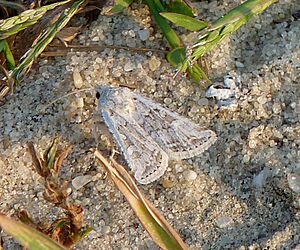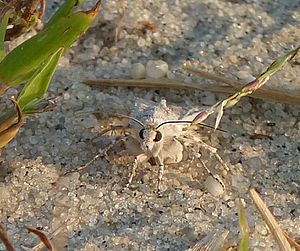Rubbed dart facts for kids
Quick facts for kids Rubbed dart |
|
|---|---|
 |
|
 |
|
| Scientific classification | |
| Kingdom: | |
| Phylum: | |
| Class: | |
| Order: | |
| Family: | |
| Genus: |
Euxoa
|
| Species: |
E. detersa
|
| Binomial name | |
| Euxoa detersa (Walker, 1856)
|
|
| Synonyms | |
|
|
The rubbed dart (scientific name: Euxoa detersa) is a type of moth. It is also known as the sandhill cutworm or sand cutworm. This moth belongs to the Noctuidae family. A scientist named Francis Walker first described this species in 1856.
You can find the rubbed dart moth in many parts of North America. It lives from Newfoundland in the east, all the way to Alberta and the Northwest Territories in the west. Its range also extends south to North Carolina and Nebraska.
About the Rubbed Dart Moth
The rubbed dart moth is a medium-sized moth. Its wingspan is usually between 30 and 35 millimeters. That's about 1.2 to 1.4 inches wide.
Adult moths are active during the warmer months. You can see them flying from July through October. These moths typically have one generation each year. This means they complete their full life cycle once per year.
What Rubbed Dart Larvae Eat
The young rubbed dart moths are called larvae. They are also known as caterpillars or "cutworms." These larvae eat many different plants. They feed on crops like corn and various types of grasses. They also enjoy cranberries, saltwort, and sea-rocket plants. Sometimes, they eat common garden vegetables and grains grown for food.
How Rubbed Dart Larvae Affect Plants
The larvae of the rubbed dart moth are known for their feeding habits. They build small tunnels or burrows in the soil. From these burrows, they feed on the parts of plants that are underground. This includes the roots and lower stems.
Because of this, they can cause a lot of damage. They are especially destructive in fields that have sandy soil. This is why they are often called "sandhill cutworms." Their feeding can harm crops, making them a concern for farmers.

